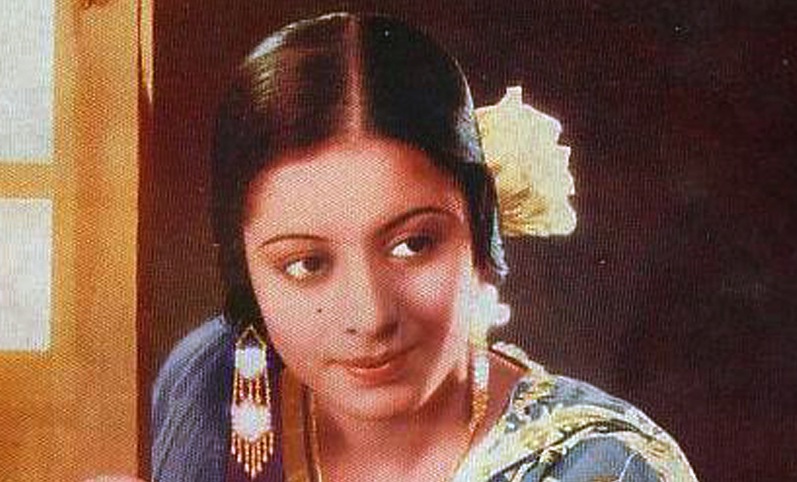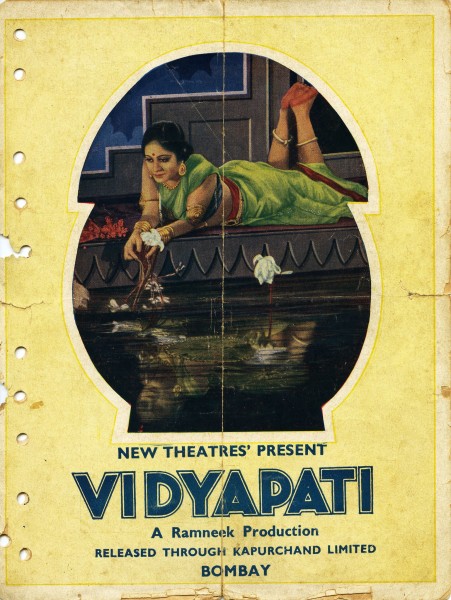Kanan Devi was among the early singing stars of Indian cinema. Her singing style, usually in rapid tempo, was instrumental in some of the biggest hits of the New Theatres Studio in Calcutta. An untrained singer when she first entered films, she studied briefly with Ustad Allah Rakha in Lucknow in order to improving her singing. She was then employed as a singer at the Megaphone Gramophone Company receiving further training from Bhishmadev Chatterjee. She later honed her singing skills even more by learning Rabindra Sangeet from Anadi Dastidar.
There are no official documents supporting her birth but it is generally accepted that she was born Kananbala on April 22, 1916. She made her debut as a child actress with the film Joydev (1926), initially working with Madan Theatres before moving on to Radha Films in films mainly directed by Jyotish Bannerjee. Some of her films with Bannerjee include Rishir Prem (1931), Jorebarat (1931), Vishnumaya (1932), Kantahaar (1935) and her big breakthrough film as an actress, Manmoyee Girls School (1935).
The great PC Barua approached her for the role of Paro in Devdas (1935) that he was making at New Theatres but Radha Films did not let her go citing her contract with them. The role subsequently went to Jamuna and became the latter’s career defining role. Ironically, Kanan Devi later found out that in actuality, her contract with Radha Films had already expired but they had conveniently kept her in the dark about it! Fortunately for her, she did subsequently join New Theatres and also played the lead in Barua’s Hindi/Bengali bi-lingual Mukti (1937). Mukti sees Kanan Devi play a rich woman who divorces her husband, played by Barua himself. She later runs into him in the jungles of Assam with her new husband on an elephant hunt. Events finally play out where Barua dies saving her from a lecherous trader. The film made her a big star and led to a hugely fruitful association with New Theatres where she made some of her finest films, which were, like Mukti, mostly bi-linguals in Hindi and Bengali.
Her most famous film at New Theatres was undoubtedly Debaki Bose’s Bidyapati (Bengali)/Vidyapati (Hindi) (1937) in which she also gave perhaps her finest performance as the faithful follower of the poet Bidyapati/Vidyapati played by Pahari Sanyal. Its success made her the studio’s top star ahead of even Kundan Lal Saigal. To quote critic Krishna Chaitanya on her act in Bidyapati/Vidyapati, “Kanan Devi has the marvellous gift of smoothly carrying over to the melodic elaboration, the intimate expressiveness of speech – occasional aspiration of vowels, accented speech rhythms, sensitive manipulation of volume.”
Kanan Devi’s other important films with New Theatres include Street Singer (Hindi)/Saathi (Bengali) (1938) opposite Kundan Lal Saigal, Sapera (Hindi)/Sapurey (Bengali) (1939) and Lagan (Hindi)/Parichay (Bengali) (1941), the last again with Saigal. But even though Kanan Devi was a singing sensation, she understood music and song were always secondary to the primary business of telling a story. In fact, powerful narrative appeal made up for most of the technical and other deficiencies Bengali cinema may have suffered from at the time and was a key to the success of the New Theatres Films. Thankfully for Kanan Devi, there was as much focus on her acting as singing in her films for the studio. To her credit, she proved to be a fine dramatic performer as well and would go on to win the Bengal Film Journalists’ Award (BFJA) for Best Actress for Parichay.
Kanan Devi remained the top star of New Theatres till she resigned in 1941 over a salary dispute and subsequently began to freelance in Hindi and Bengali films. Shesh Uttar (Bengali)/Jawab (Hindi), reuniting her with Barua and coming the following year in 1942, saw perhaps her biggest ever hit song, Toofan Mail, sung in both languages. The song is fondly remembered by old timers even today and the film won her a second BFJA for Best Actress.
Kanan Devi turned producer with Shrimati Pics in 1949 and later launched the Sabhyasachi collective with the film Ananya (1949). Her own productions were mainly based on well-known Bengali author Sarat Chandra Chatterjee’s stories and were directed by her second husband Haridas Bhattacharjee, a former naval officer and Additional Deputy Commissioner to the Governor of West Bengal. Earlier in 1940, Kanan Devi had got married to Ashok Moitra, the son of well-known Brahmo Samaj Educationist, HC Moitra. However, the marriage broke up in 1945 over the issue of her continuing to work in films after her marriage.
Kanan Devi’s last film as an actress was Indranath Srikanta-o-Annadadidi (1959) though she continued to produce the odd film thereafter. She was awarded the Padma Shri in 1968 and wrote her autobiography, Sabare Ami Nomi, in 1973. Her crowning glory came in 1977, when Kanan Devi, the first lady of the Bengali screen, was deservedly awarded the prestigious Dadasaheb Phalke award for her invaluable contribution to Indian Cinema. She also founded and worked as the President of the Mahila Shilpi Mahal, an organization that helped aged and needy female artistes of yesteryear.
Kanan Devi passed away in Calcutta on July 17, 1992. Lata Mangeshkar, no less, gave her a fitting tribute in her Shraddhanjali series when she sang two of her songs, Ae Chand Chhup Na Jaana and Toofan Mail, both from Jawab.




Can you please accurately edit this biographical account of India’s first movie superstar Kanan Devi? She was also India’s first woman film producer and the founder of Rupashee, India’s first female artist- owned studio in Kolkata. Please watch Madhabi Mukherjee’s recent interview about Kanan Devi on YouTube. You can find a lot of
information in this interview.
Unfortunately, at one place in your article, she was mentioned as ‘Anand Devi’. Please re-edit the article to incorporate additional input and also to correct some information.
Thank you!